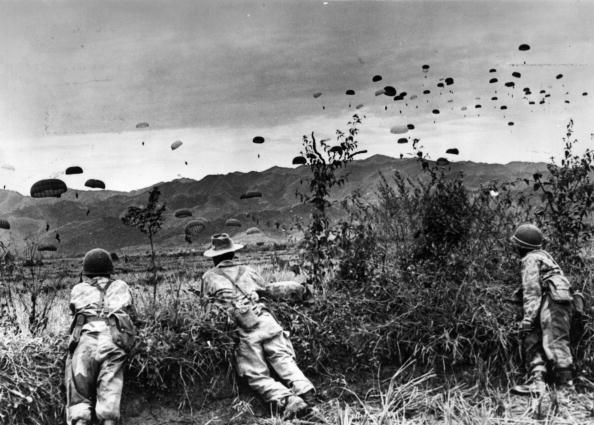“We might give them a few.” Did the US offer to drop atom bombs at Dien Bien Phu?
By Fredrik Logevall | February 21, 2016

Editor's note: It was 1954, and the surrounded French garrison was facing defeat in what would become known as the First Indochina War. What happened next has been a source of controversy for decades. The author of a 2013 Pulitzer Prize-winning book on Vietnam gives his view, drawing on the array of materials that have slowly emerged.
It is one of the most tantalizing questions of the long and bloody struggle for Vietnam: Did US Secretary of State John Foster Dulles in the spring of 1954 offer French foreign minister Georges Bidault two atomic bombs for use against Viet Minh positions near the beleaguered French garrison at Dien Bien Phu in remote northwestern Vietnam? For decades historians have investigated the matter, with no consensus emerging. But what does the evidence actually say? The time is right for a fresh look.
At first glance, it might seem odd that the United States would even contemplate providing large-scale military aid to the French army; after all, what did America care if imperial France lost one of its colonies in remote Asia? But this was the depths of the Cold War. Anxious to prevent the “fall” of another Asian nation to communism soon after the so-called “loss of China” and a bloody three-year stalemated war against communist forces in Korea, the United States was willing to send weaponry to aid the French—even if there was considerable doubt among experts as to how committed Viet Minh leader Ho Chi Minh really was to advancing the cause of global communism. (“Isn’t he first and foremost a nationalist?” many analysts speculated.) Ultimately, the United States had gambled on staying with the imperial status quo and propping up a repressive French regime in Indochina, to the point that by early 1954 Washington covered the lion’s share of the cost of the war effort.
Consequently, the situation of the surrounded French army at Dien Bien Phu—seemingly days away from collapse and what would be one of the worst battlefield defeats in French history—posed a dilemma for US planners: What to do now? Double-down on their bet, or regroup and try to salvage at least a piece of Indochina at the upcoming great-power negotiations in Geneva? And if they did decide to stay in the game, should they offer France—their proxy force—the use of the ultimate weapon?
What happened next has always been unclear. Did Dulles indeed tell the French that the United States could make available atomic bombs for use against the enemy? For years and years, Dulles and his apologists have claimed that no such offer ever occurred. And as there was no independent American (or British) confirmation of the verbal exchange, the verdict of history seemed to many to be that Dulles was right, and that no offer was ever made.
But was that really the case? Over the years, more memoirs and notes have emerged from individuals who were present either in Paris or at discussions at the White House, the Pentagon, and the National Security Council. We can now get a better picture of the overall thinking at the time, and clues to what was likely said.
Ike and Operation Vulture. The conversation between the two senior diplomats occurred in Paris on April 22, 1954. It was a somber affair. For more than seven years, the French Empire had fought its losing military effort to retain control of its colonies in Indochina against revolutionary forces under Ho Chi Minh; despite major American support the effort was faltering, and as the year turned the military situation was acute. With public opinion in France wavering under the strain of high casualty lists and military setbacks, Paris tried to secure direct American air intervention to relieve the Dien Bien Phu siege, under a plan codenamed Operation Vulture.
More so than many historians have suggested, President Dwight D. Eisenhower gave serious consideration to such an intervention. He viewed the outcome in Indochina as crucial to US strategic interests—it mattered more than Korea, he believed. But his mind was not yet made up as Dulles’s plane touched down in the French capital. In recent days more grim news had come from Dien Bien Phu, and French commander Henri Navarre pressed for immediate and massive US air support, despite deep private doubts that any such intervention would come in time to save the garrison.
In the initial session on April 22, Bidault painted a bleak picture of the scene at Dien Bien Phu; in the past few days the situation had become, he said, virtually hopeless. Nor was any kind of breakout from the encampment possible, since the wounded could not be moved and the able-bodied troops refused to leave them behind. Only one thing now had any chance of saving the situation, Navarre and his subordinates believed: Namely a massive air intervention of the kind America alone could undertake, involving 200 to 300 carrier-based aircraft.
Dulles was noncommittal. Before any US military strikes could occur, he said, Paris would need to commit to an internationalization of the struggle (under a plan known as United Action) and would have to give the French-supported government of Vietnam an “independent” role going forward, meaning it would be able to negotiate on its own to receive American aid. Bidault shook his head at the thought of effectively setting Vietnam on the first steps of the road to independence. France was fighting to hold on to the jewel of its empire, while the United States was fighting to stop communism—and the two goals were not necessarily in harmony. As on many previous occasions, a “dialogue of the deaf” (in the French expression) ensued, as Dulles argued for giving full independence to the noncommunist Vietnamese and Bidault answered that by doing so France would abandon the whole reason behind going to war in the first place. According to Dulles’s account, the Frenchman concluded the session with an ominous warning: If the fortress fell, France would want to pull out completely from Southeast Asia and assume no continuing commitments, “and the rest of us would have to get along without France in this area.”
It was an unpromising start to the proceedings. Bidault, according to several sources, left the meeting angered by the Americans’ stubborn fixation on United Action when he could think only of Dien Bien Phu, while Dulles for his part told British officials over lunch that the French were on the verge of quitting Vietnam altogether. When tripartite talks (involving also Britain) got under way that afternoon Bidault’s mood had not improved. He was garrulous, ironical, and obscure, and more than a few of the twenty-odd people the room, aware of his weakness for drink, suspected he was inebriated. A British observer suspected exhaustion more than alcohol, but the effect was the same: Nobody really understood what the Frenchman was saying. “[He] said he was casting himself to the wolves, into the waves, under the train, but we could not quite make out which wolves, waves, train.” Bidault also read out a “declaration of French intentions” which indicated a French commitment to defending the Associated States at all costs, but which later in the meeting he seemed to dismiss as merely “une tendance” which he did not plan to publish.
Turning to Dulles, the foreign minister noted the presence of American ships in the Gulf of Tonkin and Dulles’s repeated public statements that the United States would not tolerate the expansion of communism. If Washington so desired it could now reconcile those twin realities by assisting her ally at Dien Bien Phu. “He merely looked glum,” Bidault later remembered of the American’s reaction, “and did not even promise to repeat my request to Washington.”
But Dulles did offer a response, the nature of which has been shrouded in controversy for more than half a century. According to Bidault, the American took him aside during an intermission and asked him whether atomic bombs could be effective at Dien Bien Phu. If so, Dulles allegedly went on, his government could provide two such bombs to France. Bidault said he turned down the suggestion flat, on the grounds that the bombs would destroy the garrison as well as the Viet Minh, while dropping them farther away, on supply lines, would risk war with China. When informed a few months later of Bidault’s claim, Dulles said he could not recall making such an offer and insisted there must have been a misunderstanding.
Given Bidault’s visible exhaustion on the day in question, and his muddled speechmaking, and given the lack of any British or American confirmation of the claim, it is reasonable to suppose Dulles had it right: No offer was made. On the other hand, Bidault’s version is supported by senior French official Jean Chauvel in his memoirs, and by French general Paul Ely in his diary, which was kept on a daily basis. Ely, a key player on Indochina strategy in these months, wrote that he was of two minds about “the offer of two atom bombs. The psychological impact would be tremendous, but the [military] effectiveness would was uncertain, and it carries the risk of generalized warfare.”
Moreover, Bidault’s contention that Washington might offer atom bombs to his government had an inherent plausibility. In December 1953, when Western leaders held talks in Bermuda, Eisenhower alarmed the British and French delegations by referring casually to the atomic bomb as just another weapon in the West’s arsenal, one that might be used if the Chinese under Mao Zedong violated the terms of the recently-concluded truce in the Korean War. In February 1954, the president told Congressional leaders that in the event of war with China the United States would “go all the way,” with no limitations on targets hit or weapons used.
You could drop the Bomb, clean those commies out, and the band could play the Marseillaise. At several points in the weeks thereafter, US strategists considered the possible use of the Bomb, and according to one interpretation Operation Vulture always had, from its inception, an atomic dimension. In early April, a study group in the Pentagon examined the possibility of using atomic weapons at Dien Bien Phu and concluded that three tactical A-bombs, properly employed, would be sufficient to obliterate the Viet Minh effort there. Admiral Arthur Radford used this finding to suggest the use of the A-bomb to the National Security Council on April 7. According to Air Force Chief of Staff Nathan Twining, “You could take all day to drop a bomb, make sure you put it in the right place…and clean those Commies out of there and the band could play the Marseillaise and the French could come marching out…in great shape.”
Admiral Felix Stump may have had Radford and Twining in mind when he remarked, in a later oral history, that “some people … felt that it would be very simple” to have dropped three atomic weapons around the periphery of Dien Bien Phu, on the far side of the peaks controlled by the Viet Minh. The weapons were in place, and an attack could have been launched within minutes of receiving the order.
On April 29, 1954, mere days after the Bidault-Dulles encounter in Paris, the use of “new weapons” in Indochina was raised for discussion in a meeting of the NSC Planning Board. Some participants argued that using atomic power in Vietnam could deter China from retaliating in response to expanded conventional attacks, while failure to employ it would lead Mao’s government to conclude that the United States lacked the will to take advantage of is technological might. National Security Adviser Robert Cutler raised the matter with Eisenhower and Vice President Richard Nixon the next morning, and they replied that atomic weapons would likely not be effective at Dien Bien Phu. But they agreed, according to the meeting notetaker, that “we might consider saying to the French that we had never yet given them any ‘new weapons’ and if they wanted some now for possible use, we might give them a few.”
According to Nixon’s memoirs, Eisenhower in this April 30 meeting asked him what he thought about telling allied governments that if the United States went into Indochina she might use the atomic bomb. Nixon replied that whatever was decided with respect to the bomb, he did not think it necessary to mention it to US allies before they agreed to United Action. Eisenhower turned to Cutler and said, “First, I certainly do not think that the atom bomb can be used by the United States unilaterally [by which he meant, presumably, outside United Action], and second, I agree with Dick that we do not have to mention it to anybody before we get some agreement on united action.”
Dulles himself, during this very Paris visit, formally raised the matter of atomic weapons and their possible use, though without explicit reference to Indochina. In a speech to the NATO Council on the evening of April 23 he declared that Soviet advantages in manpower were too great—in military, political, or economic terms—for the West to overcome. Therefore, nuclear weapons must be considered part of NATO’s “conventional” arsenal. The secretary went on to assert that it must be “our agreed policy,” in the case of either general or local war, to use atomic weapons “whenever or wherever it would be of advantage to do so, taking account of all relevant factors.” Dulles sought here to speak to the furor in Europe resulting from recent H-bomb tests, and he may also have been wanting to keep Moscow and Beijing guessing as to what the West might resort to in Indochina; but his language is a further indication that the use of the bomb in the jungles of northwestern Vietnam in the spring of 1954 was, from the administration’s perspective, decidedly within the realm of possibility.
Drew Pearson, the well-respected syndicated columnist who was known for his close connections to Washington officialdom, noted in his diary on April 11 that “the Pentagon is definitely considering the use of small atomic bombs in [Southeast Asia].”
On the other side of the ledger may be put Eisenhower’s alleged assertion to hardliners Radford and Twining in this same time period. Sensitive to the scant time that had passed since Hiroshima and Nagasaki, he reportedly told them: “You boys must be crazy. We can’t use those awful things against Asians for the second time in less than 10 years. My God!” Likewise, some members of the NSC voiced concerns about political problems with allies and increased risk of general war in the event the A-bombs were used. A document in the files of John Foster Dulles, undated but clearly penned sometime that spring, asserts that “any use of atomic weapons will raise very serious problems of Asian opinion and attitude of our allies.” Moreover, “if US intervention results in war expanding to China, and [the] Soviet Union becomes involved, British and NATO opinion might well be split as to support [the] US in any use of British and NATO bases.”
What the evidence suggests. The truth about what Dulles did or did not offer his French counterpart in that gloomy Paris meeting, and about how Eisenhower really felt about using atomic bombs in the Indochina crisis, will probably never be known with precision. The president and his secretary of state said different things to different people. But the extensive discussions in the Pentagon and the NSC during the crisis about potentially using the Bomb, coupled with Eisenhower’s documented assertion on April 30 that “we might give [the French] a few,” suggests it’s entirely possible Bidault heard what he claimed to have heard.
Whatever the case, no atomic bomb was unleashed in Indochina in 1954, nor did the United States intervene with conventional weapons. Eisenhower actively considered going in with airpower and potentially ground units, but he ruled out acting unilaterally (partly on account of congressional opposition), which in effect left the matter in the hands of the British, who refused to go along despite intense US pressure. Many in Washington reacted with equanimity. They doubted whether the French would in any case implement needed political reforms in Indochina, and they knew that the American public, fresh off three years of grueling war in Korea, had little desire for another major embroilment in Asia. And besides, it was not at all clear that the new military measures would turn the war around; perhaps the most that could be hoped for was that they would delay France’s defeat and give Paris and her allies a better negotiating position vis-à-vis Ho Chi Minh’s government at the negotiations about to get under way in Geneva.
On May 7, the French capitulated at Dien Bien Phu. Symbolically, it marked the end of the First Indochina War. But as that name implies, the struggle for Vietnam was far from over. For in the months thereafter, the Eisenhower Administration, freed from the burden of French colonialism, took responsibility for “saving” southern Vietnam and making it a noncommunist bastion in Southeast Asia. As one Western power prepared to exit Indochina, another readied to step in.
Together, we make the world safer.
The Bulletin elevates expert voices above the noise. But as an independent nonprofit organization, our operations depend on the support of readers like you. Help us continue to deliver quality journalism that holds leaders accountable. Your support of our work at any level is important. In return, we promise our coverage will be understandable, influential, vigilant, solution-oriented, and fair-minded. Together we can make a difference.
Topics: Analysis, Nuclear Weapons, Special Topics
















Would the French have used the bomb? They were desperate to keep the illusion of being a world power. They thought they had won WW2.